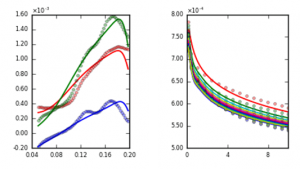The U.S. Army recently awarded CFD Research a $500k contract to further develop and validate its novel pulse voltammetry analysis toolkit (PVAT) for electrochemical systems. The Army relies on advanced electrochemical systems for a number of key needs, including power generation via fuel cells and energy storage in batteries. This Small Business Technology Transfer (STTR) award is a sequential Phase II contract building on past Phase I and Phase II successes and includes a partnership with Dr. Partha Mukherjee at Purdue University.
“Pulse voltammetry techniques, coupled with model-based analysis tools, provide a number of advantages for quantitative analysis of electrochemically active materials that govern the performance of advanced batteries and fuel cells,” said Dr. J. Vernon Cole, CFD Research Principal Investigator. “Significant enhancements in these technologies requires a better understanding of the electrochemical mechanisms governing their performance and lifetime.”

Battery Electrode Differential Pulse Voltammetry Analysis, left, and Chronoamperometry, right, Comparing PVAT Best Fit Model Parameter Predictions (lines) to Experimental Data (points)
In prior STTR Phase I and II research, CFD Research developed and validated models that used voltammogram data from laboratory instruments to predict the response of multistep electrochemical mechanisms and determine reaction kinetic parameters. PVAT includes statistical uncertainty quantification and mechanism discrimination capabilities to guide researchers in developing detailed models that best describe the system.
The purpose of this new effort is to quantitatively characterize battery properties in order to develop optimized fast charging protocols and provide accurate state-of-charge and state-of-health prediction for the structural batteries utilized in the Hybrid-on-Hybrid Tactical Unmanned Aircraft System (H2-TUAS) program. The team will further develop and apply the pulse voltammetry analysis toolkit (PVAT), utilize related electrochemical measurement techniques and complementary physical analysis to identify charge and discharge rate controlling processes for H2-TUAS batteries, then quantify corresponding model parameters to produce models for degradation during operational duty cycles including fast charge.
The benefits for the H2-TUAS program will include enhanced steep takeoff capability, increased silent loiter capability and increased flight time to charge time ratio. Also, predictive models will allow for optimizing battery energy storage/weight tradeoffs to best meet mission needs in following programs.
“The PVAT technology can provide the key information necessary for rapid, informed development of improved battery cell designs, operational strategies, and management and control systems,” said Dr. Scott Miller, CFD Research vice-president of Energy and Propulsion. “The resulting characterization capabilities can be applied to related DoD and civilian needs, such as analysis and control of battery energy storage systems to minimize system lifetime cost by limiting battery capacity fade.”
About CFD Research:
Since its inception in 1987, CFD Research has worked with government agencies, businesses and academia to provide innovative solutions within the Aerospace & Defense, Biomedical & Life Sciences, and Energy & Materials industries. Over the years CFD Research has earned multiple national awards for successful application and commercialization of innovative component/system technology prototypes, multi-physics simulation software, multi-disciplinary analyses, and expert support services. CFD Research is an ISO9001 and AS9100 registered company and is appraised at CMMI Level II for services. Learn more at www.cfdrc.com.






